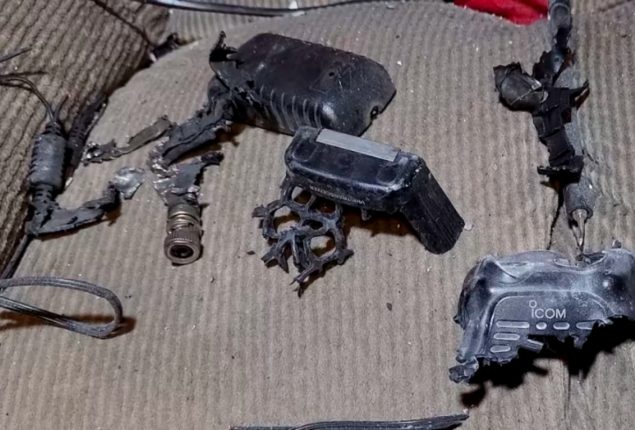Chinese warships pass through strategic waters near Taiwan and Japan
The Liaoning carrier and two Luyang III-class missile destroyers sailed southwards. This...

Japan manufacturer stopped Walkie-Talkie production after Lebanon blast
A Japanese handheld radio manufacturer has distanced itself from the walkie-talkies bearing its logo that exploded in Lebanon, stating it stopped producing the devices a decade ago. On Wednesday, explosions involving hundreds of walkie-talkies, some reportedly used by the armed group Hezbollah, killed at least 20 people and injured 450 others across Lebanon.
Photos and videos of the attack aftermath show that the devices appear to be IC-V82 transceivers made by Icom, an Osaka-based telecommunications manufacturer. However, Icom states it has not produced or exported IC-V82s or the batteries required for them in the past 10 years.
It is the second Asian company involved in bombing incidents in Lebanon this week. Earlier, thousands of exploding pagers linked to Taiwanese firm Gold Apollo killed at least 12 people and injured more than 2,000.
Gold Apollo’s founder, Hsu Ching-Kuang, flatly denied any involvement in the attacks, stating that he had licensed his trademark to a company in Hungary called BAC Consulting, which the BBC has been unable to contact. Icom told the BBC it is aware of reports that two-way radio devices with its logo exploded in Lebanon and is investigating the matter.
“The IC-V82 is a handheld radio that was produced and exported, including to the Middle East, from 2004 to October 2014. It was discontinued about 10 years ago, and since then, it has not been shipped from our company,” Icom said in a statement.
“The production of the batteries needed to operate the main unit has also been discontinued, and a hologram seal to distinguish counterfeit products was not attached, so it is not possible to confirm whether the product shipped from our company.”
Icom added that all its radios are manufactured at a single factory in Japan and that it sells products for overseas markets only through authorized distributors. Earlier, a sales executive at Icom’s US subsidiary told The Associated Press that the exploded radio devices in Lebanon seemed to be counterfeit products not made by the company, noting that counterfeit versions are easily found online.
The device is popular among amateur radio operators and for social or emergency communications, including tracking tornadoes or hurricanes, according to Mr. Novak. The BBC found Icom IC-V82s listed for sale on online marketplaces within seconds. It remains unclear at which point in the supply chain these devices were compromised and how. It is also uncertain whether some of the devices were old Icom IC-V82s or counterfeits, as Mr. Novak claimed.
Lebanon’s Annahar newspaper reported on Wednesday that the Icom walkie-talkies were old handsets. According to a security source who spoke to the news agency, the walkie-talkies that exploded were purchased by Hezbollah five months ago. Icom, which produces walkie-talkies and radio devices for marine, aviation, and land users, describes itself as a “world leader in the amateur radio market” on its website.
Asia is recognized as a global hub for telecoms and electronics, with countries such as Japan, Taiwan, and China being home to major tech producers often regarded as benchmarks of quality. BBC Verify investigated BAC Consulting, the company linked to the pagers involved in Tuesday’s explosions, and discovered that the firm has a single shareholder and is registered to a building in Budapest’s 14th district.
In addition to BAC, another 13 companies and one individual are registered at the same building. However, BBC Verify’s search of a financial information database did not reveal any connections between BAC and other companies or individuals.
Its CEO Cristiana Bársony-Arcidiacono said she knew nothing about the explosions. “I don’t make the pagers. I am just the intermediate. I think you got it wrong,” she told the news.
Catch all the International News, Breaking News Event and Latest News Updates on The BOL News
Download The BOL News App to get the Daily News Update & Follow us on Google News.